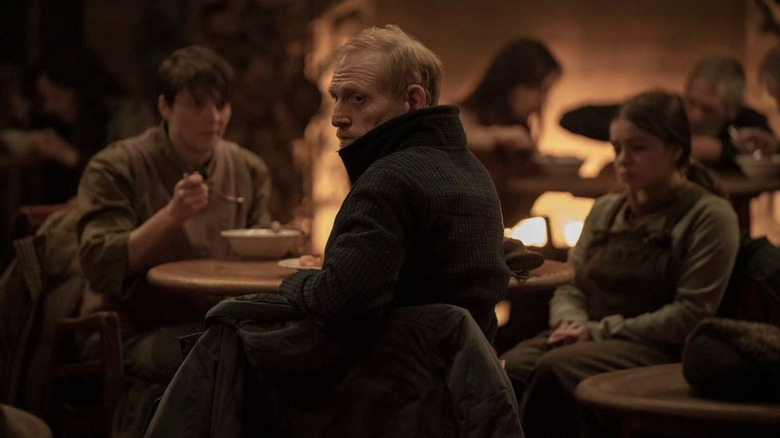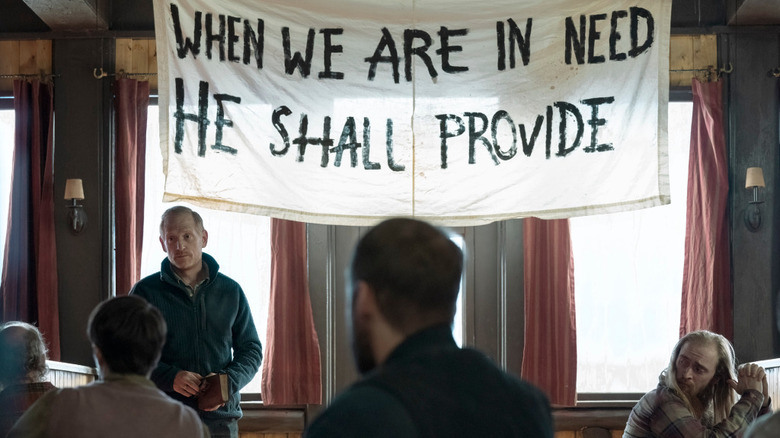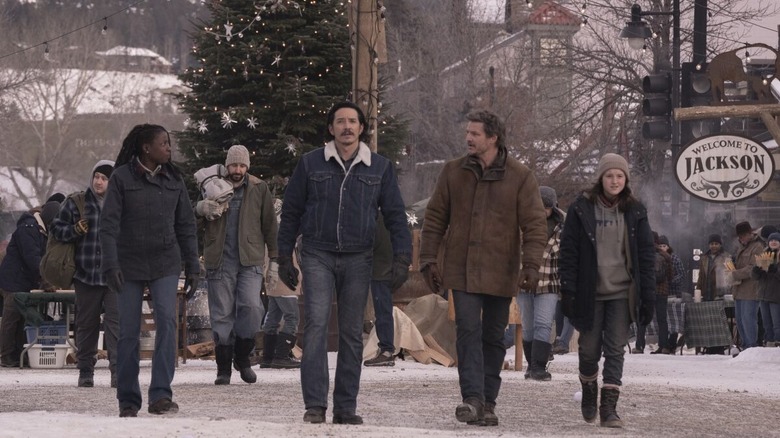The Last Of Us Reminds Us That Theocracies Are Bad, M'kay?
This article contains spoilers for episode 8 of HBO's "The Last of Us."
"I am a shepherd surrounded by sheep, and all I want is an equal. A friend." This is a line that cult leader David (Scott Shepherd, no pun intended) delivers to Ellie (Bella Ramsey) during HBO's "The Last Of Us" as a means to validate not just the cannibalism he and his followers engage in, but also as a grooming tactic in the hopes he can convince Ellie to become his post-apocalyptic child bride. The hit HBO series doesn't spend nearly as much time with David as the video game, and as such, the audience needed an expedited shorthand that says "this guy is up to no good." Show creators Craig Mazin and Neil Druckmann, the latter of which also created the original game, made the perfect decision to present David as a religious wingnut.
David and his followers have formed a miniature theocracy, defined as a system of government in which religious leaders rule in the name of God or a god. David uses his religious beliefs as a cudgel, committing unthinkable atrocities but believing he's justified because he's acting "in service of god." Of course, as anyone who has ever been on the oppressive end of religiously motivated bigotry can tell you, David and those who think and act like him are a load of barnacles. It's important to point out that critiquing David and his henchmen is not an attack on religion, but a criticism of those who use their personal religious beliefs to harm others or skirt accountability.
'He let faith kind of override it.'
During the most recent episode of "The Last of Us" podcast, Neil Druckmann and Craig Mazin dissected why David's character is so dangerous. Druckmann pointed out that David is convinced of the Christian belief that "everything happens for a reason," the idea that everything happens according to God's will, and also an obnoxious catchphrase that some religious folks like to chirp at people when they get diagnosed with cancer or experience a death in the family.
"It's becoming too much," Druckmann said. "And I think he let faith kind of override it." There is a danger in blind faith, and while Druckmann agrees there can be a positive side to having faith because "you can maintain hope in these extraordinary circumstances," David's theocratic way of living is no way to build a society. "He hasn't prepared for the winter in the way that Jackson has," he said, acknowledging the differences between the practical approach of Maria and Tommy in the Jackson commune compared to David's terrified legion of followers banking on the promise that "He shall provide."
Mazin commented, "I believe very strongly in the separation of church and state, not only because it's important to protect people who are of religious minorities, but because religion doesn't do a good job of running a state. I believe religion does a terrible job of running a state." And he's not wrong. The Republican party has been trying like hell to turn America into a theocratic country, and the more they succeed, the worse off things become. Hell, my wife and I personally had to flee a red state for our own safety because too many Bible-inspired laws were passed where I was previously living, and that's without a mushroom zombie apocalypse.
'One is better than the other'
"If you look at theocracies around the world, you will see this being repeated time and time again," said Mazin. "Where there is a theocracy, your state starts to fail." Comparing David's cannibal cult to the communist utopia in Jackson, it's pretty damn obvious which area is a better quality of life. "David is not only theocratic in nature, but he's also paternalistic in nature, which is another interesting thing to talk about the idea of how a patriarchal theocracy functions here versus a democracy built on secular law run by both men and women in Jackson," he said. "There are these very clear differences, and I think our show is not shying away from saying one is better than the other."
David rules as a singular figure at the top of the chain of command, but in Jackson, leadership responsibilities are shared among the group as a whole. "It doesn't help that he's a narcissist, and everything is about him and the love that he receives," said Druckmann. The entire world is in a time of crisis, but David is too busy existing with his entire head up where the sun don't shine to realize that what is good for his instant gratification is ultimately going to doom his followers. Then again, David doesn't really care about other people ... David cares about David.
"You know, the people that tend to end up running theocracies ... are probably not as godly as they think," said Mazin. Ain't that the truth.


